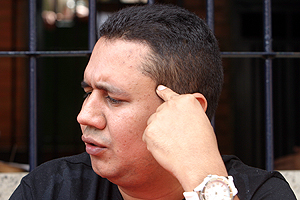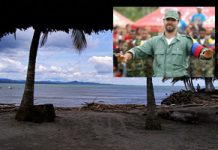The Supreme Court upheld the 8-year-sentence against Iván Laverde Zapata (alias ´El Iguano´) and modified victim compensation.
 |
|
| Iván Laverde Zapata (alias ´El Iguano,´), former boss of Bloque Fronteras, was sentenced to eight years in prison. |
As in earlier decisions made by the courts of Justicia y Paz against Edward Cobos (alias ´Diego Vecino) and Enrique Banquez (alias ´Juancho Dique´), the Supreme Court ratified, after 18 months, the sentence against ´El Iguano,´ the former boss of the Fronteras Front of Bloque Catatumbo of Norte de Santender and made certain modifications in the compensation of his victims.
On Dec. 2, 2010, the court of Justicia y Paz convicted Laverde for the murder of 170 people in 25 massacres and four officials in Cúcuta, Norte de Santander and its surroundings. Among the victims include gubernatorial candidate Tirso Vélez, public defender Iván Villamizar and former mayor Pauselino Camargo.
Laverde testified that he was one of the men designated by Carlos Castaño to control Norte de Santander, and his power in the state was such that he managed to infiltrate the police, the Attorney General, the DAS, the army, the police and INPEC. Bloque Catatumbo left behind more than 5,000 victims, some of whom were cremated by the group.
At the time, the sentence was appealed by the victims, who disagreed with the idea of equal reparations in each case. The Supreme Court affirmed this objection, and calculated compensation for material damages based on the information presented by each victim.
The court explained that “equity is an auxiliary to justice,” but that this concept did not apply in the case of victims with sufficient material damage. Regarding moral damage the court ordered, according to the degree of kinship, a payment of 100 or 50 times the minimum salary.
The victims were satisfied with the precedent the Court is setting in these types of decisions. “There is already a clearer process of reparation that the victims can follow that has clearer guidelines for moral and material damages,” victims advocate Arturo Mojica said.
Regarding the time in prison that Laverde still needs to serve, as in the cases of ´Diego Vecino´ and ´Juancho Dique,´ the Court said that it would recognize the time he was held in INPEC facilities but not the time spent in concentration zones following the demobilization.
The court also recalled that in the case of this paramilitary boss, who has spent more than six years in prison, the alternative sentence will not immediately be enforced; that is, before his eight years are completed, certain requirements will have to be approved, such as the complete compensation of victims.
In the case of the land restitution that was being carried out and then suspended, because the justices of guarantees questioned the competence of the accusing entity with restitution processes, the Court made it clear that if the entity had the capacity, it would be given a free hand for the resumption of the processes.
The Supreme Court also confirmed the jurisdiction of the court of Justicia y Paz in the expropriation of property, and ordered the forfeiture of several farms returned by Salvatore Mancusco to repay the victims, despite claims by ´El Iguano´ that he has no property. Laverde and Mancusco were bosses of the paramilitary group that ventured into Norte de Santender, in the name of the United Self-Defense of Córdoba and Urabá.
Laverde´s defense refused the offer of a reduced sentence for confessing, complying with the law and accepting the charges. In this case the High Court recalled that those were necessary conditions in a process of transitional justice, as is presented in the law of Justicia y Paz.
The Court rejected the possibility that the crimes would be considered war crimes, affirming that they should be considered crimes against humanity.











